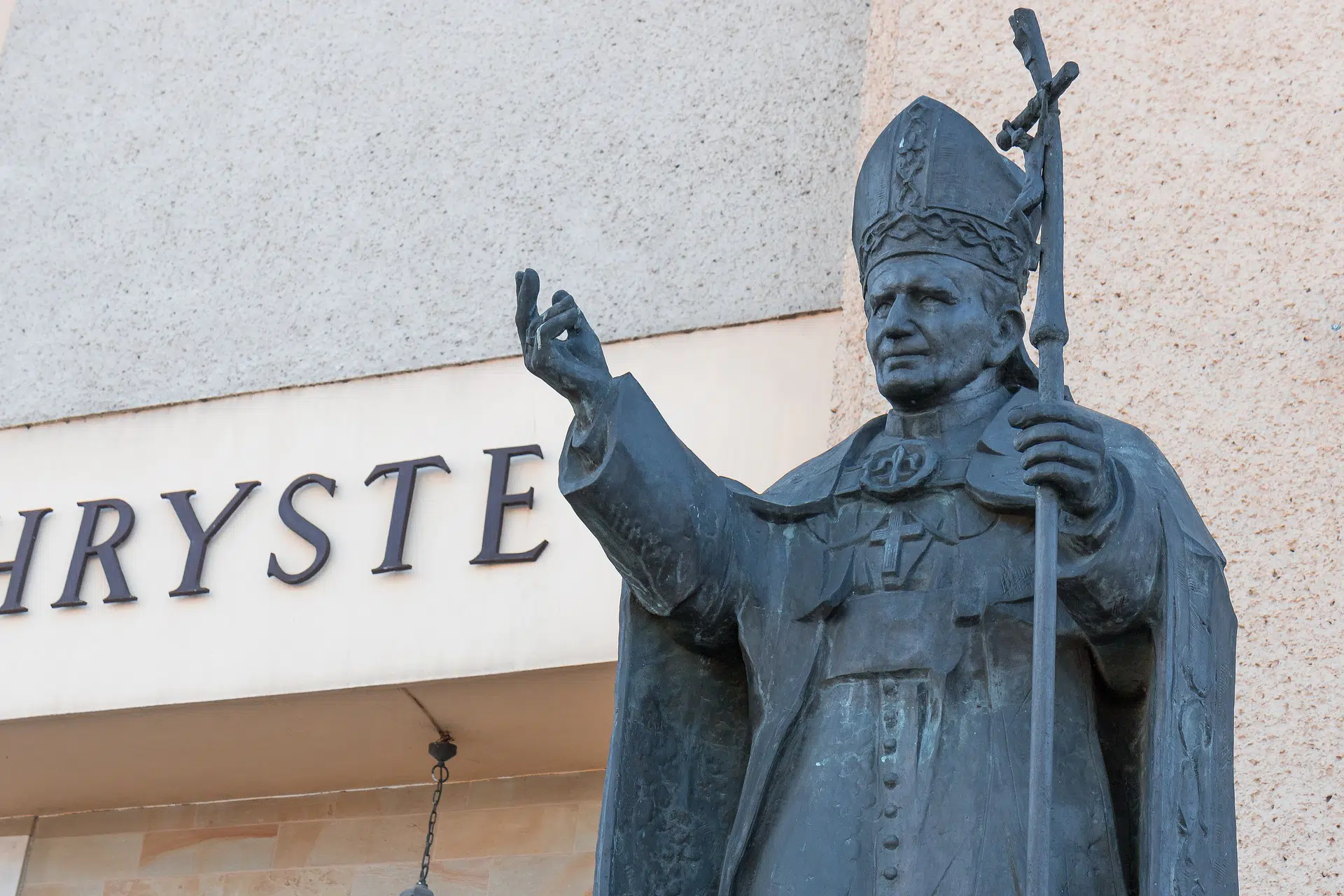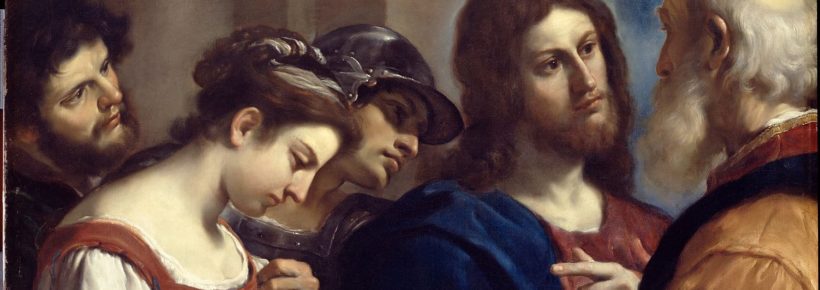Our world is saturated and infatuated with sex. We see scantily-clad women on billboards and on TV advertisements. We see ads on TV for birth control pills, for IUDs, and for the little blue pill for men. We hear about sex in song lyrics, in jokes on TV, and in the news. It’s no wonder that teens are curious. According to a recent report: “In 2017, 40% of high school students in the United States reported that they had ever had sex.” To put that number in perspective, in a high school of 2,000 kids, 800 of them are having sex. As parents, we should be frightened. As Catholics, we should be terrified.
In her article “Protecting Your Kids from Premarital Sex,” Susan Ciancio reminds us that according to Church teaching, parents are the first and principal educators of their own children, especially in such a delicate area as human sexuality. This is why Susan alerts parents not only to how a sex-saturated society is harming their teenage children, but also how school sex “education” is perverting their minds and hearts with an immoral and hedonistic view of human sexuality.
She also gives parents valuable tips about associating with other parents to defend their children from school sex “education” and how they themselves can warn their children about the evils of premarital sex.
However, in this article we are not going to dwell on how parents can protect their children from school sex “education” or on how they can warn them about the evils of premarital sex. Rather, we are going to show parents how they can use some of the beautiful thoughts on chastity found in the theology of the body (TOB) of St. John Paul II to effectively teach purity to their teenage children.
Learning the Theology of the Body
“But I, as a parent, am overwhelmed by the complex and difficult language used by St. John Paul II in his catechesis about TOB. What can I do?”
Don’t worry, HLI has prepared a series of articles that summarize and explain some of the key ideas found in TOB.
We would also like to point out that the Church has issued a beautiful document titled “The Truth and Meaning of Human Sexuality” that is specifically directed to parents (available in book form here). Its introduction is filled with TOB concepts. So just by reading it, you can get a good idea of what St. John Paul II taught in his catechesis.
Moreover, this introduction, as the rest of the document, helps parents apply key TOB concepts to the chastity education of their children. We highly recommend this extraordinarily beautiful and practical document to parents and other chastity educators working under the authority of parents.
What Is Chastity?
It is important to clarify from the outset that the Catholic Church emphasizes the concept of chastity education rather than sex education.
The main reason for this is that the Church defines chastity as “the successful integration of sexuality within the person and thus the inner unity of man in his bodily and spiritual being” (CCC 2337). This means that chastity is a virtue by which we can successfully place the human values inherent to human sexuality at the service of authentic love. But this in turn implies that the chaste person is able to put his sexuality under the control of his mind, heart, and will, and not let his bodily passions deviate it from its God-intended values and purposes.
This control of the soul over the body is not a despotic control, as if the body and sexuality were something “dirty” or “evil” in themselves. On the contrary, this control is exercised rationally, lovingly, and wisely. The objective is that the use of human sexuality attain its inherent values: authentic love and openness to life. Our bodily functions and impulses need to be under the sweet but firm control of our souls so that they can be themselves, that is to say, so that they can fulfill the beautiful purposes God designed for them. In this way the body is respected and benefitted in its health and integrity. As Benedict XVI once said: “the material needs the spiritual to really be itself.”
The Foundation of TOB Catechesis
The genius of St. John Paul II consisted in showing how the goods that God’s Commandments protect resonate within the interior of the human person. Too often the Commandments are taught without clearly showing the goods they protect. In this way, the student (a child, a teen, a young adult or an adult) does not grasp the meaning, the beauty, and the importance of the Commandments. Catholics begin to think that the Commandments are arbitrary rules imposed by God from the outside. They don’t realize that God has inscribed in our very being (a profound unity between body and soul) the goods that Commandments protect and promote. For example, the Fifth Commandment that prohibits murder has been designed by God to protect and value bodily integrity as well as human life in all its stages: from conception to natural death.
St. John Paul II took pains to explain the harmonious connection that there should be between the objective (the Commandments) and the subjective (the interior of the human person). Once people recognize and appreciate the goods the Commandments protect and promote, they are moved by the love of God and neighbor and the Commandments themselves to act in a loving and righteous way.
In the case of chastity education, the parents must be able to teach their teenage children what the goods of chastity are so that they can appreciate them and joyfully discipline themselves to live by them.
Before we proceed, we must make an important distinction. St. John Paul II called the interior of the human person (his heart, his intellect, his will, and his feelings) by the term subjectivity. Subjectivity is not the same as subjectivism. In fact, they are opposite to each other. Subjectivity is the place inside the person where he or she appreciates the beautiful and objective goods inherent in God’s commandments. Once a person appreciates and accepts those objective goods they become subjective values in his heart. But these subjective values are anchored in the objective goods they appreciate and accept. In other words, a human value is the subjective appreciation of an objective good.
Subjectivism, on the other hand, is the erroneous theory that claims, “if feels good, then do it.” It bases moral truth on subjective feelings without any real connection with objective reality. Subjectivism leads to selfish individualism and relativism. Relativism is the erroneous and very dangerous “moral” theory that denies the existence of objective moral goods and principles. It claims that each individual person has his or her own “morality.” This is nothing other than a recipe for individual and social disaster. It leads to a permissive “morality” that accepts as “good” anything that brings pleasure or relief from difficulties: fornication, adultery, abortion, and contraception, among other evils.
Bringing TOB into Chastity Education
“OK, I get the main foundational concepts of the TOB. But what about a more direct and concrete way in which parents can teach their children about the values of human sexuality, life, marriage and the family?”
Let us begin with the inherent values of human sexuality. God has inscribed these values in the very being of the human person: love, life and the sacramental sign. In this article we will focus on the value of love.
We all know that love is a concept that has been manipulated so much that it has been either deprived of any substantial meaning or reduced to the acquisition of any type of sexual pleasure. This erroneous way of looking at love has been enshrined by the gender ideology into the LGBT propaganda familiar to everyone nowadays.
Parents must teach their teenage children the beautiful concept of love that St. John Paul II taught in his TOB. Following the II Vatican Council, St. John Paul II taught that God loves us for ourselves and not as a mere means for something else. God loves the beautiful universe he created and all the goods of the earth for the human person, but He loved the human person for himself. God showed His love for us by sending His only begotten Son to die on the cross for us and to give us eternal life with Him and His People (see John 3:16).
Loving People for Their Own Sakes
If God loves us for our own sake, then we must love ourselves and our neighbor in the same way. This implies that we must never use ourselves and others as objects of sexual pleasure or for any other selfish end. We must love ourselves and others for who we are: human person created in the image of God and destined to eternal life.
Being loved by God for our own sake also implies that in the eyes of God, we have an intrinsic value. We, as human persons, are goods in ourselves. We must love ourselves and other people because we and they are goods in themselves.
Moreover, since God has called us to eternal life with Him and His people, He values us infinitely. Therefore, our value as persons is inherent and infinite. The love that corresponds to such a value must be unconditional and life-long. Unconditional love means that we must love ourselves and others not because we or they have a lot of money, are popular at school, have beautiful bodies, or any other condition.
Jesus Christ gave us the supreme example of unselfish love not only by dying on the cross for us, but also by loving and defending “the least of these my brethren” (see Matthew 25:31-46). He was obviously referring to those society regards as “unworthy”: the little child, the poor, the sick, the widow, the leper, and so on.
Today the “least” of our brothers and sisters are especially unborn babies and the terminally sick or very old. These classes of persons are unappreciated and even despised by those in power or those who live selfish lives. If we truly obey God’s Commandment to love we must never reject these persons but defend them in any way we can. In doing so we will become true lovers of God and neighbor. We will be transformed in such a way that our spiritual and moral beauty shall shine forth through our bodies. Mother Teresa was not an attractive woman. However, from her being shone a light of love that all who approached her could perceive.
If parents share these beautiful concepts with their children and give them examples of unconditional love, their children will grow with a sense of self-respect and joy because of God’s love for them. They will be more inclined to love and respect others and shun temptations to use others for selfish ends.
Moreover, they will be better prepared to understand the kind of love their sexualities must express when they commit themselves in marriage to love and honor their future spouses.
Love as the Gift of Self
Another beautiful aspect of this concept of love that parents must teach their children is the fact that each one of us is gift from God to others and to ourselves. God had no need to create us and the rest of the universe. He created us out of love, to share His love and wisdom with us. He created us as gifts to Himself, to others and to ourselves. Love is inherently gratuitous. Its inner dynamic is to love for free, as a gift.
Imagine now that everybody would see themselves and everybody else as gifts from God. How different would the world be! We would experience the peace and happiness that can only come from authentic love.
In the case of marriage, this love would mean that the spouses would welcome each other as gifts from God and would give themselves as gifts from God in order to enrich their spouses.
But in order for this love-as-gift to be effective, we must discipline ourselves by getting rid of every thought, attitude, place, behavior, and dress that are contrary to this humble love that is always ready to forgive and serve. All of the energy raving in us will be channeled in beautiful ways by which we can be true friends and serve and defend others, especially those most in need: the unborn and their moms, the elderly, the poor, or a classmate who struggles with his homework or is despised and unpopular.
Achieving the “Freedom of the Gift”
If we discipline ourselves in the ways we think and act in order to truly love, we will acquire what St. John Paul II called “the freedom of the gift.” True freedom means that you are free from selfishness and have the power to love despite obstacles and temptations. You are free to be a gift to God, to others and to yourself.
Unfortunately, today freedom is conceived as the ability to do whatever one wants. But that is a false freedom that can lead to slavery. Think of the teen who took drugs for the first time just to be accepted by his peers and be a “cool guy” but ended up as an addict. Think also of those who are enslaved by pornography, a truly evil and perverse way to distort the beautiful gift of human sexuality that God gave us only for marriage. Think about those who are addicted to violence and become members of gangs just to have a sense of belonging.
True friendship is important for chastity. If you belong to a Church group in which its members are trying to love as God commanded us, you can give and receive the support you and others need to lead pure and loving lives. Moreover, you will be able to receive a lot of wisdom and good advice from the spiritual director of the group, whether a priest or a mature adult. This advice should be a continuation of the counsel you receive from your parents.
In our next article we will continue to explore the beautiful concepts that St. John Paul II discusses in his catechesis about TOB and how parents can use these concepts in their conversations about chastity with their young adult sons and daughters.
Related Content
Adolfo is the Director of Education for Hispanic Outreach for Human Life International and of HLI's Hispanic outreach arm Vida Humana Internacional. He has a Masters in Theology from St. Vincent de Paul Regional (Major) Seminary and a License in Moral Theology from the Alphonsian Academy in Rome.
Adolfo has traveled frequently to VHI’s affiliates in Latin America to give talks, training sessions, and media interviews. He has authored and co-authored books, articles, reports, and a pro-life training course for Hispanics in the U.S. Adolfo has also participated in the production of two TV pro-life series in Spanish, which have been aired through EWTN en Español.






















